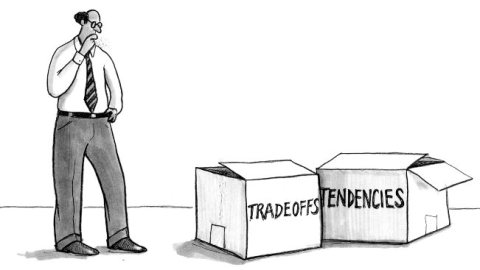Economic Doctoring And Tradeoff Types

“Should economists be advocates or engineers?” asks Noah Smith. Tradeoffs reveal how reliably they perform as either.
Smith worries that his trade’s “engineering” aspects are being sacrificed for “political advocacy” (e.g. some economists act like “a free-market priesthood,” not as neutral experts). He cites Google’s “real secret sauce” to illustrate good econ-engineering: rock-star economist Hal Varian, who designed their profusely profitable ad auctioning system.
Great, but how else are economists like engineers? Consider “tradeoffs”: Most economists believe “that there is a tradeoff between prosperity and income equality.” Yet the IMF finds “no observed tradeoff between [redistribution] and… economic growth.” Do engineers have such disputes?
1. Mechanistic tradeoffs: Engineering has direct iron-law tradeoffs, like car weight vs. fuel efficiency. Would cars built using economics-like tradeoffs be safe? When engineers don’t know why something works, they won’t build without knowing under what conditions it does.
2. Micro-deviancy: Microeconomics might have iron-law engineering-like tradeoffs, but engineering never uses components whose behaviors can deviate from prior patterns.
3. Macro-flip-flops: macroeconomics is even less engineering-like. Apparently economists may have gotten the “basic relationship” between interest rates and inflation “exactly wrong.”
4. Complexity-matched: Are economies like engines or bridges? No, they’re trickier. Not even climate systems or ecologies have parts that change behaviors as rapidly as people in markets.
7. Model tendencies: Models are relationships encoded. Despite well understood micro-level relationships climate models aren’t great. Economic modellers face complexities compounded by weaker relationships. Thanks to multi-step cascading effects and diffusely coupled psychologically contingent behaviors, composite “tradeoffs” are likely indirect and unmechanistic. They’re tendencies not tradeoffs.
5. Economic doctoring: Economists are more like medics than engineers. Doctors don’t build what they work on; they have good science in some areas but much remains unknown.
6. Medieval doctrines: Despite having hyper-modern math-models, economists seemingly use medieval-medic-level doctrines. They grasp some basics (engineering-like bones and bleeding) but few systemic “mechanisms” or treatments are known (and “diagnoses” always lead to bloodletting).
8. Ethics trading: To paraphrase Upton Sinclair, it’s difficult for people to advocate what their salary depends on them not advocating. Since political interests fund much economic research (e.g. Mercatus Center underwritten by “staunchly anti-regulatory” groups) are pre-commitments skewing research and interpretations? Just politics (and regulatory capture) “disguised as science”?
Good economists make clear their uncertainties, often nobody really knows (here, here). Socrates said, “Admitting ignorance is the beginning of wisdom.” Economists please wise up.
Illustration by Julia Suits, The New Yorker Cartoonist & author of The Extraordinary Catalog of Peculiar Inventions.





